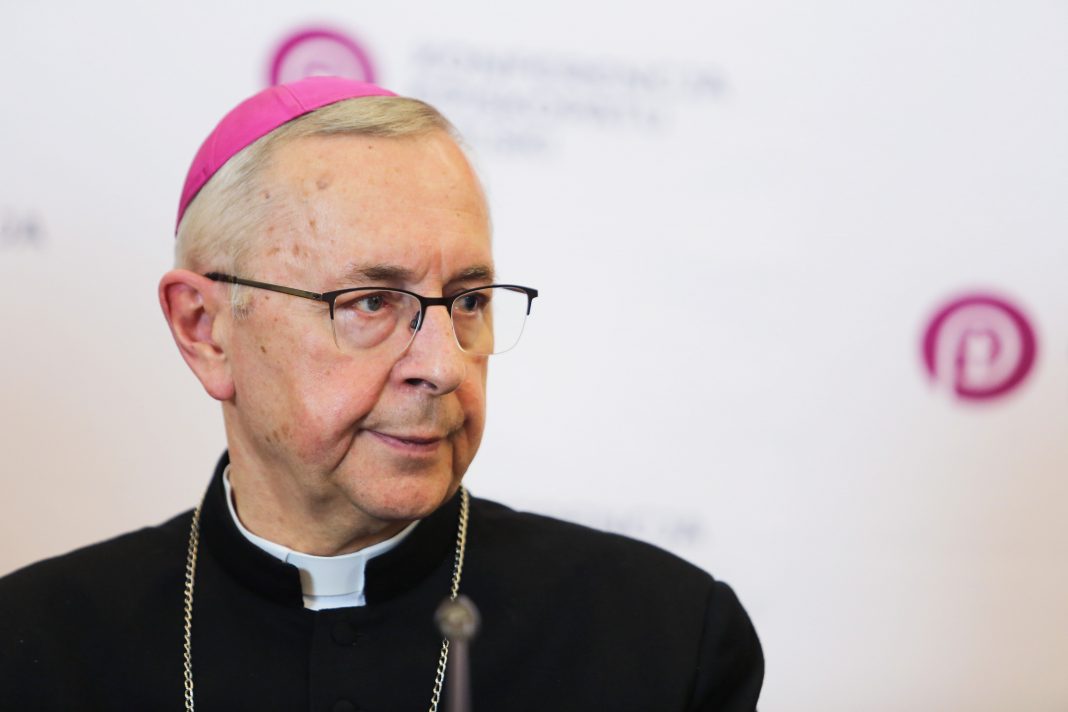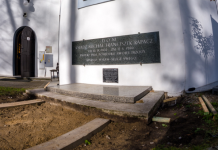„Abortion is always a violation of the fundamental human right to life, a violation even more abhorrent because it concerns the life of the weakest and completely defenseless human being. It is, therefore, a manifestation of the most unjust discrimination,” wrote Archbishop Stanisław Gądecki, the President of the Polish Bishops‚ Conference, in a statement issued in connection with the European Parliament draft resolution on health and sexual and reproductive rights in the European Union (Matić Report).
Archbishop Stanislaw Gądecki appealed to the members of the European Parliament to vote against the draft resolution. In a statement, he reminded Catholics „in a situation where the documents to be voted on target fundamental human rights and values that are non-negotiable, they cannot accept any compromise, but should unequivocally combat such initiatives.„
In his statement, the Episcopate‚s President stressed that competence in health care has never been transferred to the European Union and belongs to the exclusive competence of member States. He recalled that any action by the European Union in this area must „respect the responsibilities of the Member States for the definition of their health policy and for the organization and delivery of health services and medical care.„
Archbishop Gądecki noted that the resolution contains false information, for example, about the protection of life in Poland, and its authors „using a distorted concept of human rights, suggest not only that there is such a thing as the ‚right to abortion‚ (…), but also that it is one of the recognized human rights. The President of the Bishops‚Conference stressed that „none of the international human rights documents mentions the existence of such a right,„but on the contrary, these documents guarantee the right to life, without mentioning the right to kill.
„Abortion is always a violation of the fundamental human right to life, a violation even more abhorrent because it concerns the life of the weakest and completely defenseless human being. It is, therefore, a manifestation of the most unjust discrimination. The legal authorization of abortion profoundly distorts social life, let alone its recognition as an ‚essential health service‚,„ stressedArchbishop Gądecki.
The President of the Polish Bishops‚ Conference pointed out that the authors of the resolution negate not only the right to life but also another fundamental human right: the right to freedom of conscience. He stressed in a statementthat „the European Union in the Charter of Fundamental Rights explicitly mentions the right to conscientious objection, which is a special characteristic of this organization. The right to conscientious objection, including for medical workers, is explicitly guaranteed in the constitutions of many member states. The adoption of the resolution could, therefore, also be seen as an attack on the constitutions of many Member States.„
The debate and vote on the European Parliament‚s draft resolution on health and sexual and reproductive rights in the European Union (Matić Report) is scheduled for 23 and 24 June 2021.
Press Office of the Polish Bishops‚ Conference
We publish the full text:
STATEMENT
OF THE PRESIDENT OF THE POLISH BISHOPS’CONFERENCE
ON THE RESOLUTION OF THE EUROPEAN PARLIAMENT
ON THE RIGHT TO ABORTION AS A HUMAN RIGHT
It is with deep concern and surprise that I have received information about the draft resolution of the European Parliament on sexual and reproductive health and rights in the European Union (Matić Report). Given that „under the principle of conferral, the Union shall act only within the limits of the competences conferred upon it by the Member States in the Treaties,„ and that „any competences not conferred upon the Union in the Treaties remain with the Member States„ (Art. 5.2 TEU) (Art. 5.2 TEU), and bearing in mind that the competence in the field of health care has never been transferred to the European Union and, consequently, belongs to the exclusive competence of the Member States, it can be considered that the authors of the resolution are calling for a violation of Union law. Only the supportive nature of EU competence in this field is explicitly confirmed by Articles 6 and 168 TfUE. Any action of the European Union in this area should therefore „respect the responsibilities of the Member States for the definition of their health policy and for the organization and delivery of health services and medical care„ (Art. 168.7 TfUE).
The authors of the resolution cite false information in the draft, e.g., regarding the protection of life in Poland, and misrepresent the concept of „reproductive and sexual rights„ as a binding international obligation and an element of human rights (e.g., letters C, F, F of the draft resolution). Furthermore, using a distorted concept of human rights, they not only suggest that there is such a thing as a „right to abortion„ (e.g., letter Y of the draft resolution and the explanatory memorandum), but moreover that it is one of the recognized human rights. No international human rights document mentions the existence of such a right, including the documents cited by the authors of the resolution, i.e., the International Covenant on Civil and Political Rights; the International Covenant on Economic, Social and Cultural Rights; the Convention on the Elimination of All Forms of Discrimination against Women; and the European Convention on Human Rights. These documents expressly guarantee the right to life, but they do not mention the right to kill.
It should be noted that EU treaty law also affirms the inviolable dignity of every human being (Article 1 of the CFR), his/her right to life (Article 2 of the CFR), and the prohibition of eugenic practices (Article 3b of the CFR). The EU is also obliged to protect the rights of the child (Article 3 TEU). Furthermore, in the case of Olivier Brüstle v Greenpeace eV, the European Court of Justice acknowledged that the human embryo is the bearer of human dignity (paragraphs 32 and 36).
Abortion is always a violation of the fundamental human right to life, a violation even more abhorrent because it concerns the life of the weakest and completely defenseless human being. It is, therefore, a manifestation of the most unjust discrimination. The legal authorization of abortion profoundly distorts social life, let alone its recognition as an „essential health service,” as requested by the authors of the resolution (letter J of the draft resolution). John Paul II wrote: „When a parliamentary or social majority decrees that it is legal, at least under certain conditions, to kill unborn human life, is it not really making a ‚tyrannical‚ decision regarding the weakest and most defenseless of human beings? Everyone‚s conscience rightly rejects those crimes against humanity of which our century has had such sad experience. But would these crimes cease to be crimes if, instead of being committed by unscrupulous tyrants, they were legitimated by popular consensus?„ (Evangelium Vitae, no. 70). The right to life is, in a way, the litmus test of democracy. Where it is not fully guaranteed, the state ceases to be a „common home„ where all can live according to the basic principles of equality and turns into a tyrannical state which usurps the right to dispose of the lives of those who are the weak and defenseless, of unborn children (cf. Evangelium Vitae, no. 20).
The authors of the resolution also negate, apart from the right to life, the second fundamental human right, the right to freedom of conscience, which is also guaranteed in Article 10.1 of the EU Charter of Fundamental Rights. Moreover, they reject the emanation of the right to freedom of conscience in the form of the right to conscientious objection guaranteed in Article 10.2 of the CFR. It should be underscored that the European Union in the Charter of Fundamental Rights explicitly mentions the right to conscientious objection, which is a special characteristic of this organization. The right to conscientious objection, including for medical workers, is explicitly guaranteed in the constitutions of many member states. The adoption of the resolution could, therefore, also be seen as an attack on the constitutions of many Member States.
In the light of what has been said above, we appeal to all Members of the European Parliament to vote against the draft resolution. We also remind Catholic MEPs that in a situation where the documents to be voted on target fundamental human rights and values that are non-negotiable, they cannot accept any compromise, but should unequivocally combat such initiatives. „Catholic involvement in political life cannot compromise on this principle, for otherwise the witness of the Christian faith in the world, as well as the unity and interior coherence of the faithful, would be non-existent„ (Congregation for the Doctrine of the Faith, Doctrinal Note on some questions regarding the Participation of Catholics in Political Life, no. 3).
✠ Stanisław Gądecki
Metropolitan Archbishop of Poznan
President of the Polish Bishops’ Conference
Vice-President of the Council of the Conferences of European Bishops (CCEE)
Warsaw, 22 June 2021

 English
English







